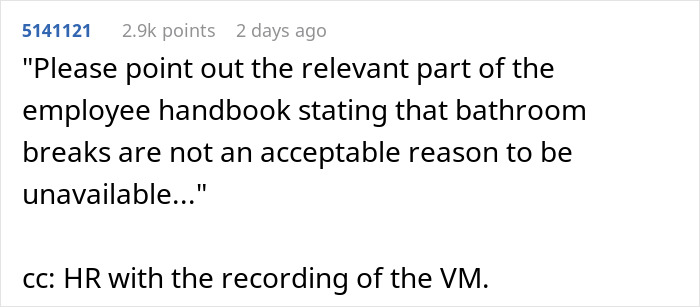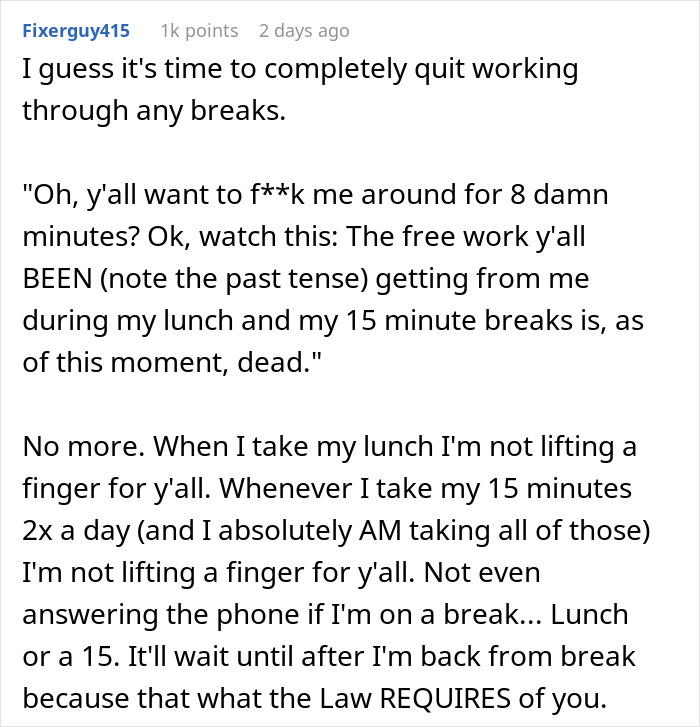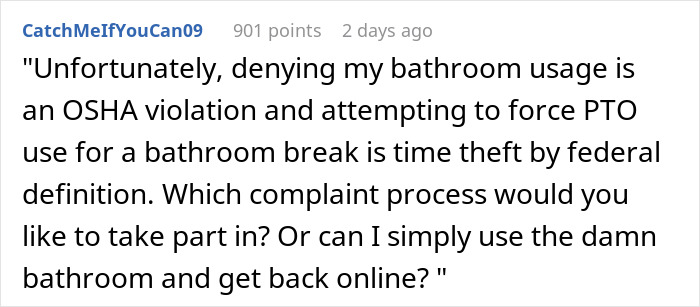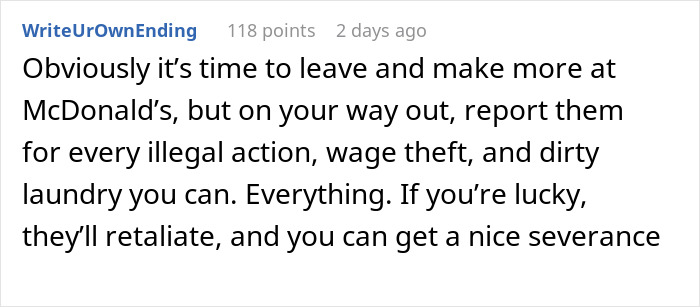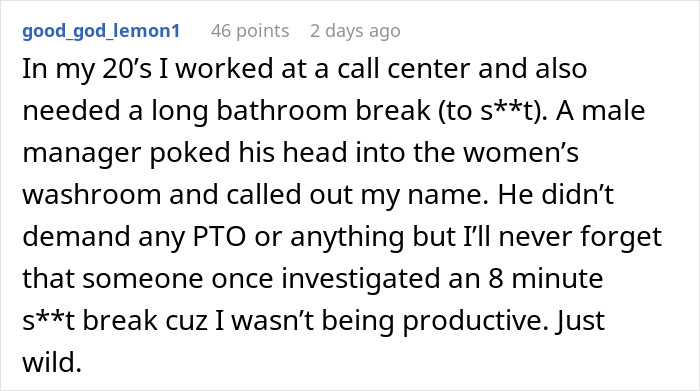Trust and support are fundamental to motivating your team to do well at work. Unfortunately, some managers don’t quite understand some of the basics of leadership and only ever aim to punish others. At times, these punishments are beyond ludicrous. And some management decisions specifically discriminate against remote workers.
Case in point, Reddit user u/SpecterGygax, who works remotely, recently went viral on the r/antiwork online community after sharing just how much their boss micromanages them. They received an actual warning for going to the bathroom, during which time they were offline for a few minutes. Scroll down for the full story, as well as the internet’s reactions.
Bored Panda reached out to the author of the story, u/SpecterGygax, and they shared some more context about what happened, as well as what proper support in the workplace should look like. You’ll find our full interview with them as you read on.
Some bosses micromanage their employees to an incredibly unhealthy extent

Image credits: Queenmoonlite (not the actual image)
One remote employee shared how their manager called them out for taking a restroom break
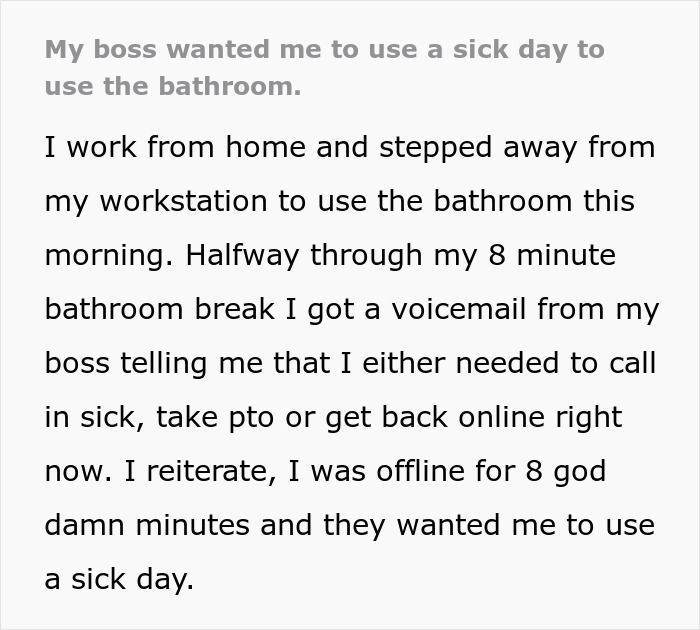
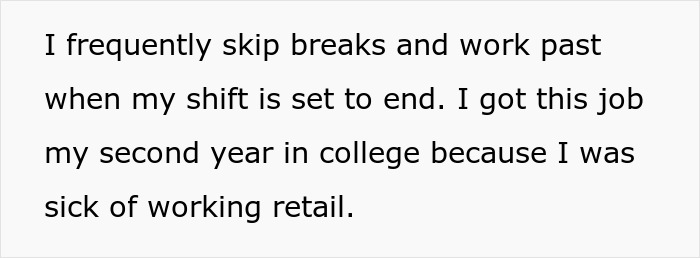
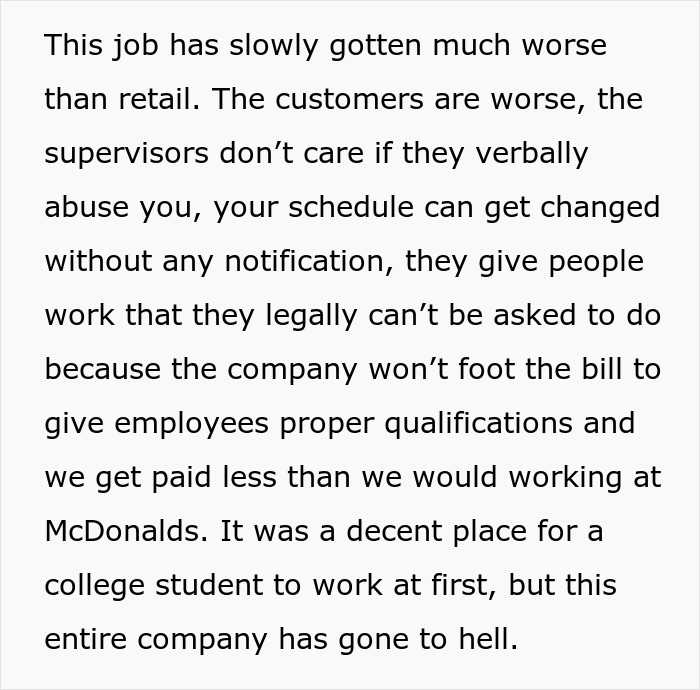

Image credits: Prostock-studio (not the actual image)
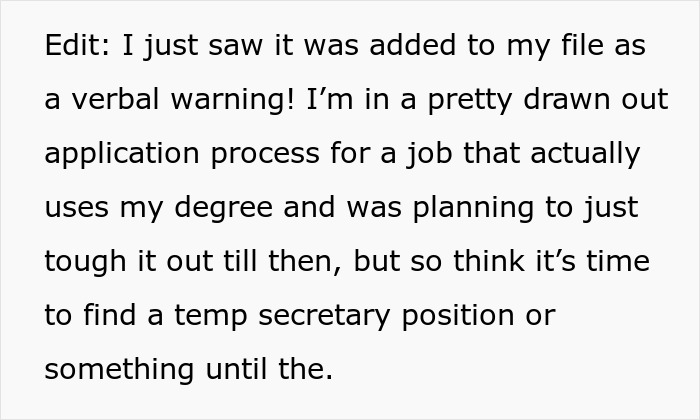
Image credits: u/SpecterGygax
The company’s culture saw some massive shifts over the years
We asked the author of the post about their initial reaction when they got the voicemail from their boss. “When I first got the voicemail I was honestly a little confused. With the exception of broad policy changes that affected everyone, I’d never really had any issues with my supervisors,” u/SpecterGygax explained to Bored Panda.
“This is the first time in 3 years I’ve ever been singled out for discipline like this and this boss and I have had a fairly decent working relationship before this,” they shared that this sort of behavior was very out of character for their manager.
According to the OP, proper support in a workplace ought to be based on recognition and reward. This is actually what their place of work used to focus on quite a bit in the recent past.
“We were given incentives and rewards for picking up extra shifts, having good attendance, and going above and beyond in our work,” the redditor opened up.
“Back then, their workforce was very motivated and happy. As those incentive programs have slowly been rolled back, most people have stopped going above and beyond.”
We were also interested in getting the OP’s thoughts on why some bosses track their employees’ movements to such great lengths. Redditor u/SpecterGygax told us that there isn’t just one single reason for this.
“I doubt most bosses are doing so maliciously. Sure, there are probably some bosses who get into a management position and for whatever reason decide to go on a power trip. We’ve all had bosses like that, even before these new trends of mouse trackers and keyloggers. I think the main cause most bosses are facing is pressure from their bosses,” the author told Bored Panda.
“Everyone reports to someone and if you go far enough up the line, eventually you find someone that cares more about productivity models than people. Then they start putting pressure on their subordinate and it keeps traveling down the line until it hits us,” they said.
“I’m sure the work from home model doesn’t help this particular issue either. I haven’t ever met most of my bosses in person so to them I’m little more than a name on a screen.”
Micromanagers don’t trust their employees and track their activities to stay in control
As Indeed points out, micromanagers fundamentally don’t trust their staff to do a good job and they want to be in control, at all times. They want frequent updates about tiny details.
They’re unwilling to delegate tasks because they believe they can do things better themselves. And if they do delegate, they might try to ‘fix’ their colleagues’ work.
Micromanagers also tend to be obsessed with documentation and detailed reports. What’s more, they’ll feel awful if they’re not included in work decisions.
One way to tell if you’re dealing with a micromanager at work is to see whether they’re keeping tabs on employee communication. If someone lashes out at others when they lose control, they might be a huge micromanager.
The way the boss handled the entire situation speaks volumes about their priorities
As the OP explained in their post, the entire situation was unfair from start to finish. First of all, they have to deal with a boss who is a massive micromanager, tracking their every move. Secondly, the boss set a precedent that some restroom breaks can be ‘too long,’ which is, frankly, ridiculous.
Third of all, there’s bound to be frustration brewing at the company if nature calls… and your boss calls along with it, sending a voicemail. The bar for a verbal warning that goes on someone’s record is incredibly low and it’s going to be awful for motivating employees.
And fourth, the author pointed out how they often work overtime and skip their breaks as well. This shows how inflexible some managers are when it comes to remote work. It’s unlikely that someone would be given a verbal warning if they physically went to the bathroom if they were at the office. Flexibility is something that many workers value very highly. Managers who don’t prioritize it can end up losing some of those talented employees.
Instead of looking at work results or the broader context, some managers use the simplest metric possible to see if someone is being ‘productive’: the fact that they’re online and communicating with you.
Being productive every single second of the workday is impossible
Some bosses take this micromanagement to the extreme, demanding that their workers install tracking software on their computers. They want their staff to work every single second of the workday, without downtime.
This is ludicrous for a few reasons. Namely, it creates a situation where pretending to do something is seen as more valuable than, y’know, actually working. On top of that, it fosters mutual mistrust. Moreover, these managers completely ignore the reality of how work gets done.
Research shows that the average worker is productive for less than 3 hours per workday. Or, to put it more simply, people get tired quite quickly.
‘Inc’ reports that employees spend over an hour reading news websites, 44 minutes checking their social media, and 40 minutes talking to their colleagues about non-work stuff.
The rest of their time is spent searching for new jobs, taking smoke breaks, making calls to people, making drinks, sending messages, eating snacks, and making food.
In other words, someone who works at the office may not be more productive than someone working remotely. There are plenty of distractions (including necessary restroom breaks) for everyone.
Management needs to find ways to motivate their staff, not just punish them for minor transgressions
Productivity and drive will depend on an employee’s work ethic, motivation, and sense of purpose. Someone who loves what they do, receives fair pay, and has a supportive manager is going to move mountains—no matter if they’re at home, in the office, or at a sunny beach in a tropical location.
Of course, this doesn’t mean that there aren’t some bad actors out there. Some workers can and do abuse the WFH system to their advantage, pretending to work while getting paid. Remote and hybrid work are great systems, so long as everyone plays by the agreed-upon rules.
These rules have to make sense. Most employees probably don’t want to be threatened for going to the restroom. Similarly, managers expect their staff to prioritize their work, not side projects, chores, and leisure activities.
If there’s a genuine issue with productivity and effort, bosses definitely need to address it. However, these requirements have to be fair and grounded. Sanctioning someone for being offline for a few minutes is neither of those things. And these bosses might soon find their most hard-working and talented employees jumping ship and sailing for greener pastures.
The author shared some more info in the comments
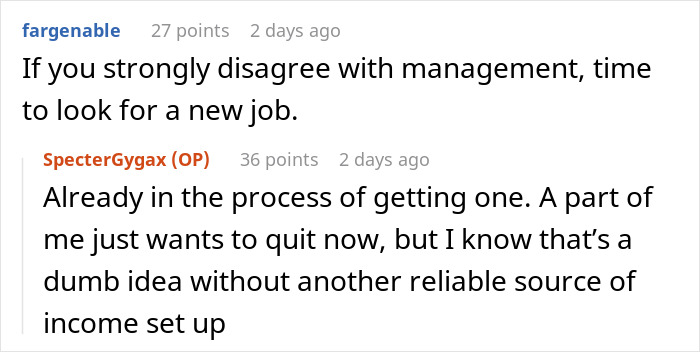
Here’s how the Antiwork online community reacted to the story. Many readers had useful suggestions for the worker

